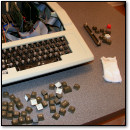[ Retro Scan of the Week ] The Age of Data Entry
August 13th, 2012 by Benj Edwards The IMS 5000IS: Your Key to Office Neck Pain
The IMS 5000IS: Your Key to Office Neck Pain
It’s almost amusing to recall the days when secretarial computer work mostly involved data entry and/or printing. (In this case, data entry inspired the neck-cramping computer setup seen here.) Both of those activities were designed to bridge the world of the computer and the world of paper.
By the mid-1990s, the introduction of low-cost scanners paired with optical character recognition (OCR) software helped relieve the tedium of typing in paper-bound data by hand.
Today, such scanning happens far less frequently, as most text-based data originates in the computer space to begin with. And many times it stays there, too: office workers regularly publish data electronically to the Internet or share it over local networks and email, making routine printing (and routine data entry) far more uncommon tasks in the year 2012 than they were in the 1990s.
Discussion Topic of the Week: Was there ever a time when you were forced to do lots of manual data entry? Tell us about it.






August 13th, 2012 at 11:03 am
When I was in college (early ’90s), I still preferred to do much of my writing longhand. It was my habit, and a comfortable tactile experience. Then those scribbles would be typed into a word processor and printed for class.
Honestly, it’s not a bad way to work. You catch errors and think about what you’ve written before committing to it. Not that I’d care to do it now…
August 13th, 2012 at 11:52 am
I still do it for certain class lecture notes where I couldn’t take the notes fast enough if I used a computer. Mostly it happens with math classes where the symbols & layout take too long to do on anything other than paper. After the class, once there’s no more time pressure to write as fast as the professor talks, I then type them up.
August 14th, 2012 at 1:29 pm
Typing in a racing game from a Compute!’s Gazette on a Vic-20 back in the early 80’s. It was my first computer and I was so bummed when I typed everything in (over several days) and it wouldn’t work. Finally a work friend of my mom went through it with me and we found small typing errors had derailed the whole thing. It was then that I learned that with computers you had to be very precise and exact when dealing with them. Since I learned that at a young age, I have applied it throughout my life.
August 14th, 2012 at 2:07 pm
“Today, we need not even scan documents, as most data originates in the computer space to begin with.”
You my friend, do not work for the Government. I send paper monthly reports to DARPA and NASA. They usually make corrections by hand and return. The US Gov loves paper and manual data entry.
August 14th, 2012 at 2:14 pm
Even with the US Government’s ancient bureaucratic system taken into account, just imagine (or remember?) how much more paper you would have had to push before the age of computers.
August 16th, 2012 at 3:26 am
Surely, during any of the hefty amounts of code needed to build and play the games in Compute! Magazine (ca. 1982-’83). There was one particular game for the Atari 800XL—a “Lunar Lander” type of game which used this cool isometric 3D vector grid and moonscape, incorporating realistic gravity and thrust physics, etc. Good heavens, the code seemed to take up half the magazine. My friend and I both attempted to code it all in on our Ataris. After a few days we somehow got the job done. His worked, mine was full of bugs and didn’t run. =(
August 17th, 2012 at 6:38 am
It’s hard to believe, but that very pretty young woman at the keyboard in this ad is approaching retirement age now.
August 17th, 2012 at 8:47 pm
I once had a job typing in handwritten accident claims forms for several months. I thought it would be a breeze, since I can type about 80 wpm and I could listen to music. I thought, I’ll just do this easy job and then come home and do all my various projects. The only thing was, I had never typed for 8 hours a day before. That job absolutely wiped me out. I couldn’t really do anything but lay on the couch. Plus, I think there was a real psychological toll in reading about freak mishaps all day. The only upside was that the place where I was working dealing with all these claims was rightfully terrified of having its own workers file claims against them, so they went to great lengths to ensure a proper ergonomic workspace.
I also don’t think there’s been any reduction in paper use. I think computers might have actually sped things up so that we can use more paper. Those were the big two promises I remember… computers would eliminate paper, and we’d get so much more work done we’d only have to work a few hours a day. Oh yeah, and flying cars.
August 18th, 2012 at 6:58 am
Back around 197o,I had the job of entering data about programs for gifted kids into a database at OMSI (It was read into a PDP-8 from the teletype’s paper tape). Since I am the world’s worst typist, this was painful. I no sooner finished when they decided to change to format, so that all the data had to be re-entered. This would be torture, so instead I taught myself to program in BASIC and wrote a program to re-format the CSV list. It’s the only programming that I even did. Years later, I was able to explain to my 7 year old how a program he’d found in BASIC worked, and he took to it instantly. Now he makes his living coding for games. I guess hating data entry paid off!
August 20th, 2012 at 9:07 am
>> Zoyous said: “I also don’t think there’s been any reduction in paper use. I think computers might have actually sped things up so that we can use more paper. Those were the big two promises I remember… computers would eliminate paper, and we’d get so much more work done we’d only have to work a few hours a day. Oh yeah, and flying cars. ”
I feel like the “paperless office” was a promise that went unfulfilled for a long time because computers, networks, and lightweight computerized reading devices weren’t ubiquitous enough to eliminate the need to print a piece of paper and hand it to someone else. And yes, computers, for a long time, helped explode the amount of data that could be printed and passed around.
So sure, printing still happens all the time, but not as often as the pre-2000s now that one can easily email anything to just about anybody, publish stuff on the web easily, and read the computer-generated info on portable laptops, relatively lightweight tablets (like the iPad) and on smartphones that many people carry in their pockets.
I’m sure companies will still use paper for decades, especially when it is engrained in company policy (and they need hard records for legal reasons, etc.), but I do think that paper use will diminish over time.